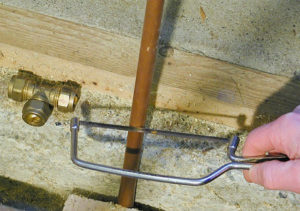Have you ever woken up to the sound of a whistling kettle and wondered how it does that? The process is actually simpler than you probably think. When the water inside the kettle boils, it creates steam, which instantly flows out of the spout. Most kettles are designed with a covered spout, and the cover has a tiny opening that controls the amount of escaping steam, which in turn produces whistle.
The electrical circuit in your building is quite similar to this boiling water scenario. When electricity is fed into your building through the high-voltage transmission lines that stretch across your neighborhood, it immediately looks for every possible outlet. Even if its voltage is reduced to a safe level as it passes through transformers, it is still high enough to cause fire and electrocution. Like a kettle that could explode if you block all passage of steam, your electric circuit can shatter when you don’t release excess static discharge. That’s where earthing systems come in.
What is an earthing system?
Earthing, more commonly known as grounding, is simply the inclusion of the earth in an electrical system as a point of reference or common return path for electric current. While other parts of the electrical system may function as a ground, nothing compares to earth when it comes to absorbing dangerous amounts of electrical charge. In fact, it is vast enough to ground all the lightning strikes around the world combined.
Apart from triggering protective mechanisms in an electrical system when internal insulation fails, earthing has several other purposes. It also limits the buildup of static electricity in applications that involve flammable products. Sparks of static electricity is notorious for igniting fire and explosion. Same goes true with electrostatic-sensitive devices, which easily break and burn when overcharged.
What metals are used for earthing?
An earthing system or electrode consists mainly of a conductive rod driven into the earth. As it is called, a conductive rod has to be made from a highly conductive metal. Even the slightest resistance can affect the circuit’s potential and may render the ground useless. There’s a wide range of options but the most commonly used are copper-bonded steel, copper clad ground rods, and galvanized steel. While all of these options show a remarkable conductive property, the one that proves to be the most efficient is copper-bonded steel. In fact, pure copper might just exceed its capacity, except pure copper rods are not easy to come by, unless you know of a trusted supplier like Rotax Metals where you can find a solid copper rod for sale in your area.
Why is copper the perfect conductive rod for an earthing system?
When choosing a material for an earthing system, you have to take into account not just conductivity but other factors as well, such as longevity and hardness. As it turns out, copper possesses all major properties necessary for this application.
Corrosion Resistance.
The conductive rod will be driven into the earth, which is usually outside your building. It will be exposed to all sorts of natural forces, and the ground itself isn’t particularly a safe haven for your rod. You probably know that most metals are not very good at resisting corrosion when exposed to moisture. Certain metals like copper, however, react to moisture differently, specifically forming patina instead of rust, which makes it perfect for any application that involves direct contact with nature.
Strength.
Copper is a ductile and malleable metal, which means it can easily be bent or twisted when applied with minimal force. When strategically alloyed, however, it becomes stronger and tougher while only giving away an insignificant portion of its corrosion resistance. This allows copper-based conductive rod to be driven nicely into the earth. Of course, some conductive rods for earthing systems are made of copper bonded steel. The steel provides the rod’s strength while the copper protects it from corrosion.
Long Service Life.
The only enemy of ground rods is corrosion due to moisture. It is the reason why they have to be constantly checked and replaced when rust has already significantly reduced their conductivity. With copper-bonded ground rods, however, you can expect it to stay in great condition for a very long time. Some immediately dismiss the idea of using copper-bonded ground rods because of the high initial cost. What they don’t realize is that these rods cost less in the long run and extend the overall life of the earthing system, eventually saving them more money than they would with other options.
If you are a contractor and grounding system installation is part of your services, don’t hesitate to offer copper rods for the electrodes and other copper & brass sales. They can be a huge boost in the quality of your service, which definitely translates into higher demand down the line. Then again, you also have to know where to buy copper rod, as not all copper products are of the same quality. Top metal suppliers in North America, such as Rotax Metals are your best option.


